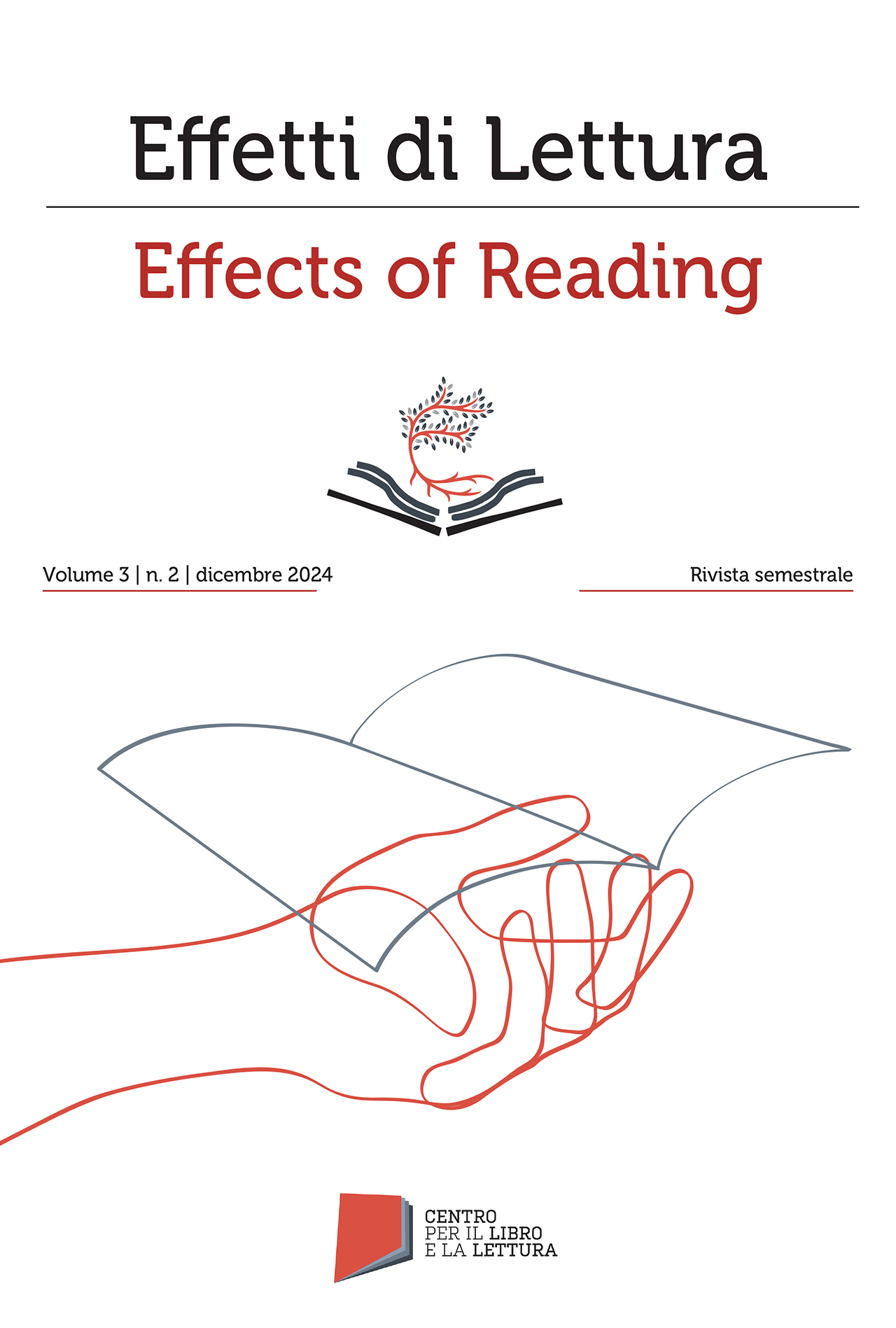Reading and corporations: first results of a questionnaire
DOI:
https://doi.org/10.7347/EdL-02-2024-02Keywords:
reading habits, reading pleasure, workplace well-being, corporate training, surveyAbstract
The article examines the reading habits of TIM employees and explores the perceived effects of these habits within the workplace. A questionnaire was administered to a sample of 1027 employees distributed across Italy. The questionnaire included 18 items that assessed four main areas: the use of reading for professional development, reading for pleasure, the practice of reading aloud to children, and general reading habits. The findings reveal that while the majority of employees engage in reading primarily for pleasure, and only a small proportion use reading as a tool for professional development. However, reading for pleasure appears to offer significant benefits in the workplace, contributing to improved personal well-being, increased work performance, and enhanced interpersonal relationships among colleagues. Additionally, the study shows that reading habits are linked to educational qualifications: university graduates tend to read more frequently and report greater benefits from their reading habits. The analysis highlights the absence of significant correlations between reading for professional development and reading for pleasure, suggesting that while reading for pleasure is widely valued for its positive impact on well-being and workplace dynamics, reading for professional development may not be as deeply integrated into employees' daily work practices. Overall, the study proposes that promoting reading—especially for pleasure—within the workplace could foster greater employee well-being, improve team dynamics, and have potential implications for corporate training programs.
Downloads
References
Batini F., Brizioli I., Mancini A., Susta M., Scierri I. D.M. (2021a), Lettura e comprensione. Una revisione sistematica della letteratura, in: Ricerche di Pedagogia e Didattica – Journal of Theories and Research in Education, ISSN 1970-2221, vol. 16, 1 (2021) - doi: doi.org/10.6092/issn.1970-2221/11509
Batini F., Luperini V., Cei E., Izzo D., Toti G. (2021b) The Association Between Reading and Emotional Development: A Systematic Review, in: Journal of Education and Training Studies Vol. 9, No. 1, gennaio 2021. doi: 10.11114/jets.v9i1.5053 https://doi.org/10.11114/jets.v9i1.5053
Batini F., D’Autilia B., Pera E., Lucchetti L., Toti G. (2020), Reading Aloud and First Language Development: A Systematic Review, in: Journal of Education and Training Studies Vol. 8, No. 12, dicembre 2020. doi: 10.11114/jets.v8i12.5047 https://doi.org/10.11114/jets.v8i12.5047
Brokerhof I.M., Ybema J.F., Bal P.M. (2020a). Illness narratives and chronic patients’ sustainable employability: The impact of positive work stories. PLOS ONE, 15(2). https://doi.org/10.1371/journal.pone.0228581
Brokerhof, I., Bal, M., & Petri, D. (2020b). Fictional Narrative Experiences and Career Identity: How Stories Influence the Dialogical Work Self. Academy of Management Proceedings, 2020(1), Article 20136. https://doi.org/10.5465/AMBPP.2020.20136abstrac
Brokerhof, I.M., Bal, M., Solinger, O., Jansen, P.J.W. (2022). The Lure of Greed Beyond the Business School Popular Wall Street Narratives and Future Work Selves. Academy of management proceedings, 2022(1). https://doi.org/10.5465/AMBPP.2022.10741abstract
De Baldini Rocha M. N. S., Ponczek V. (2011). The effects of adult literacy on earnings and employment. Economics of Education Review, 30, 755-764.
ISTAT (2023), Produzione e lettura di libri in Italia - Anno 2022, report. https://www.istat.it/wp-content/uploads/2022/12/REPORT_PRODUZIONE_E_LETTURA_LIBRI_2021.pdf
Izzo, D., Ciurnelli, B., & Carlotti , E. (2024). Promozione della lettura o educazione alla lettura? Le scelte educative delle scuole e le loro conseguenze. Effetti Di Lettura / Effects of Reading, 3(1), 014–028. https://doi.org/10.7347/EdL-01-2024-02
Mangione, S., Chakraborti, C., Staltari, G., Harrison, R., Tunkel, A.R., Liu, K.T., Cerceo, E., Voeller, M., Bedwell, W.L., Fletcher, K., Kahn, M.J. (2018) Medical Students’ Exposure to the Humanities Correlates with Positive Personal Qualities and Reduced Burnout: A Multi-Institutional U.S. Survey. j gen intern med 33, 628–634. https://doi.org/10.1007/s11606-017-4275-8
Merga, M.K. (2017). What motivates avid readers to maintain a regular reading habit in adulthood?. Australian Journal of Language and Literacy, 40, 146–156. https://doi.org/10.1007/BF03651992
Miller, P. A. (1982). Reading Demands in a High-Technology Industry. Journal of Reading, 26(2), 109–115.
Reder, S. (2010). Adult Literacy Development and Economic Growth. National Institute for Literacy.
Reder, S. (2023). Adults’ reading engagement and wellbeing in Aotearoa New Zealand. PLoS ONE 18(9). https://doi.org/10.1371/journal.pone.0286706
Rooksby, J. R. N. (2011). Text at Work. Mundane Practices of Reading in Workplaces. In M. Rouncefield, & P. Tolmie (A cura di), Ethnomethodology at Work. Ashgate.
Smith, M. C. (1990). Reading habits and attitudes of adults at different levels of education and occupation. Reading Research and Instruction, 30(1), 50–58. https://doi.org/10.1080/19388079009558033
Smith, M. C. (2000). The Real-World Reading Practices of Adults. Journal of Literacy Research, 32(1), 25-52. https://doi.org/10.1080/10862960009548063
Zhang W., Zhang, Y. & Wang J. (2022). Effect and mechanism of reading habits on physical and mental health among the elderly: Evidence from China. Frontiers of Public Health 10:1031939. doi: 10.3389/fpubh.2022.1031939
Zuilkowski, S. S., McCoy, D. C., Jonason, C., & Dowd, A. J. (2019). Relationships Among Home Literacy Behaviors, Materials, Socioeconomic Status, and Early Literacy Outcomes Across 14 Low- and Middle-Income Countries. Journal of Cross-Cultural Psychology, 50(4), 539-555. https://doi.org/10.1177/0022022119837363
Downloads
Published
How to Cite
Issue
Section
License
Copyright (c) 2025 Paolo Di Nicola, Andrea Laudadio

This work is licensed under a Creative Commons Attribution 4.0 International License.








